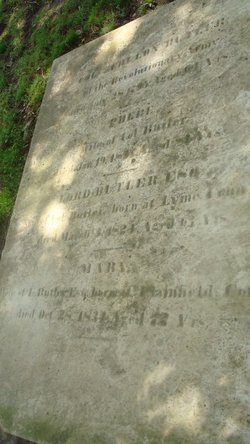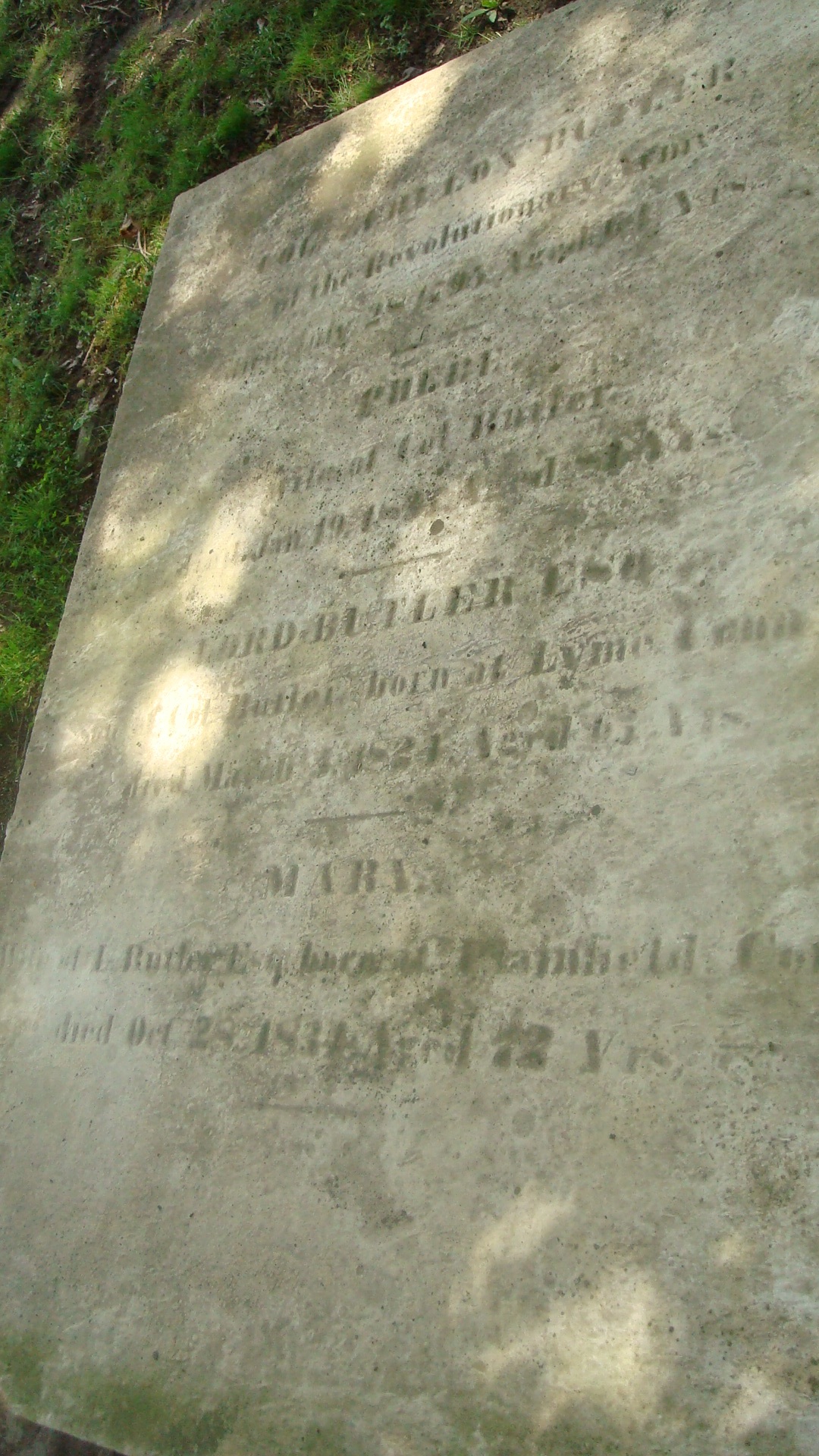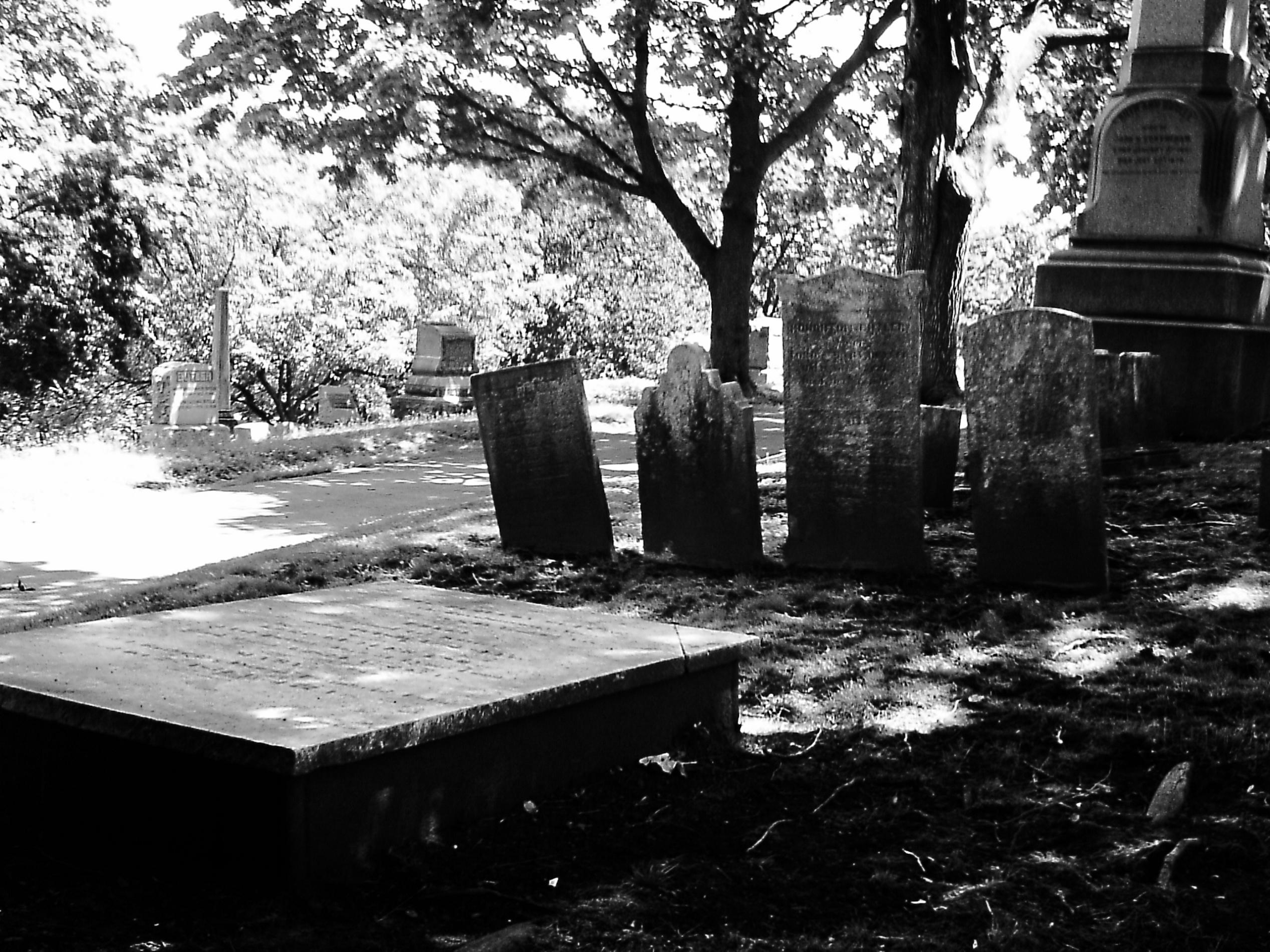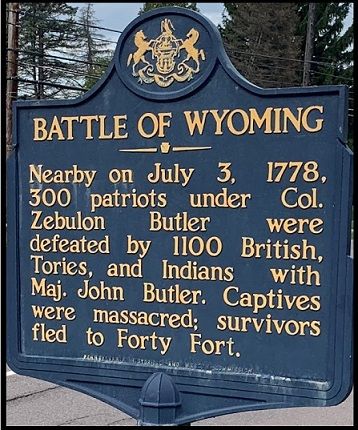by George Hollenbach Butler
"Colonel Zebulon Butler, eldest son of John and Hannah (Perkins) Butler, was born in Ipswich, Massachusetts, in 1731, and was taken by his parents to Lyme, Connecticut, at the age of five years, where he continued to reside until his removal with other Connecticut settlers to Wyoming in 1769.
When the Susquehannah Company, organized in Connecticut, sent its body of settlers to take possession of the lands it had purchased on the East Branch of the Susquehanna river, Pennsylvania, Zebulon Butler went with these settlers and located in Wilkes-Barre, and a short time thereafter became prominent in the affairs of the Wyoming settlement of the Susquehanna Company, one of the most staunch defenders of the rights of the Connecticut settlers against the contention of the Proprietaries of Pennsylvania and later of the Supreme Executive Council of Pennsylvania, and thenceforward until near the time of his death, says Charles Miner in his "History of Wyoming," "the life of Zebulon Butler is the history of Wyoming.
Almost every letter of its annals bears the impress of his name and is the record of his deeds." He was not only the military commander of the men of Wyoming in their various conflicts and frays with the Pennamites and in the warfare with the Indians, but was constantly the holder of various civil offices to which he was either appointed by the General Assembly of Connecticut or elected by the people of Wyoming, whose adviser and leader he was in all their affairs.
His early life in Connecticut had been devoted to active trading operations, with the West Indies, carrying stock and other products of Connecticut in his own sloops from Lyme to these islands, and bringing in return such commodities as were in demand in the New England colonies. He was also the owner of considerable land in North Lyme, and developed a great capacity for business, which with his natural executive ability, and his military training and experience, made him the natural leader of the Connecticut settlers in Wyoming in peace and in war.
Colonel Butler's military career began with the expedition against the French at Crown Point, in 1756, at the age of twenty-four, when he was ensign of the company commanded by Captain Andrew Ward, in Col. David Wooster's Connecticut Battalion. The company was mustered in April that year, and from about the middle of May until October or November following, was with Lieut-Col. Whiting's Battalion in camp at Fort William Henry for the campaign of Crown Point. In the campaign of 1757 Zebulon Butler served 37 weeks and 5 days as ensign of the company. Again in 1757 he was ensign of the "Rangers", Capt. Reuben Ferris, and served until May 15, 1758.
In March, 1758, he was appointed ensign of the Eleventh Company, commanded by Capt. Timothy Mather, in the Third Connecticut Regiment, commanded by Col. Eleazer Fitch, and detailed to serve as quartermaster of the regiment, in which capacity he served at Fort Edward on Lake George. May 27, 1758, he was promoted to lieutenant-colonel of the regiment. In March, 1760, of the Tenth Company, Fourth Regiment of Connecticut troops, and participated with the Continental forces in the expeditions against the French in Canada.
In March, 1762, he was appointed captain of the Eighth Company, First Connecticut Regiment, and took part in the expedition against Havana, in which his men suffered great hardships, of sickness and shipwreck. With the surrender of French domination in Canada, Captain Butler's active participation in military affairs ceased until his removal to the Wyoming Valley.
In September, 1770, Fort Durkee, occupied by the New England settlers at Wilkes-Barre, was captured by the Pennamites, and Captain Zebulon Butler was among those taken prisoners and conveyed to Philadelphia, where he was confined in the city jail several months.
At a meeting of the Susquehannah Company, held at Windham, Connecticut, January 9, 1771, Captain Zebulon Butler, Captain Lazarus Stewart, Major John Durkee and John Smith, Esq., were appointed as a committee to "repair to our settlement at Wyoming with our settlers, to order and direct in all affairs relating to the well ordering and governing said settlers and settlements." Captain Butler was at that time still in Philadelphia jail, but in July, 1771, he was at the head of an armed band of Wyoming settlers, who invested and attacked the Pennamites in their wooden fort on the River Common in Wilkes-Barre, and after a siege of twenty-six days compelled them to evacuate the fort and retire from the valley.
Captain Butler was again named at a meeting of the Susquehannah Company, April 1, 1772, one of a committee of four to "order and regulate the settlement of the lands in the Susquehanna Purchase;" and again on June 2, 1773, one of the directors, with like powers. At a general meeting of the proprietors and settlers held at Wilkes-Barre, July 22, 1773, Captain Butler was "chosen to be ye Judge of the Probates" for the settlement, and when the General Assembly of Connecticut in January, 1774, erected the whole Wyoming region into the town of Westmoreland and annexed it to the county of Litchfield, in Connecticut, Captain Zebulon Butler was appointed by the Assembly and commissioned by Governor Trumbull, a justice of the peace for the new county, and was directed to call the people of Westmoreland together and conduct an election of officers for the new town. At the election so called he was elected town treasurer, and a few weeks later was chosen one of the four representatives from the town to the General Assembly of Connecticut at its session of May, 1774. He also represented the town in the same body in October, 1774, May and October, 1775, and October, 1776.
In August, 1775, Zebulon Butler was commissioned colonel of the Twenty-fourth Regiment of Connecticut, just established by resolution of the General Assembly, and organized in the new town of Westmoreland, and generally known as the Westmoreland Regiment. January 1, 1777, he was appointed and commissioned by the Continental Congress, lieutenant-colonel in the Army of the United States, and was detailed to duty in Wyoming Valley.
In the following January he was commissioned lieutenant-colonel of the Third Regiment, Connecticut Line, commanded by Col. Wyllys, in the Continental service, and soon afterwards joined Washington's army at Morristown, New Jersey. This regiment formed part of the brigade commanded by Major General Israel Putnam. Later he was in command of Connecticut troops in defense of Danbury, Connecticut.
At the time of the battle of Wyoming he was home for brief furlough, and was urged by the officers of his old regiment, the Twenty-fourth, to take command of the almost undisciplined force about to march to oppose the invading British and Indians under Colonel Brant. He commanded the right wing of the American line of battle on Abraham's Plains, July 3, 1778, which resulted so disastrously to the brave defenders of the Valley.
In November, 1778, he was promoted colonel of the Second Connecticut Regiment, to date from March 13, 1778, and from August, 1778, to February, 1781, was in command at the "Wyoming Post." On the latter date he was ordered to the command of the new Fourth Connecticut Regiment, encamped at or near West Point, New York, and remained in command of this regiment, chiefly on the Hudson, until January, 1783, when he was placed in command of the new First Regiment, formed by the consolidation of the Connecticut troops, and with which he remained in camp at and near West Point until its disbandment in June, 1784, when he returned to his home in Wilkes-Barre.
On March 17, 1779, he had been commissioned by Congress colonel of the Second Regiment, Connecticut Line, his commission being signed by John Jay, President of the Congress.
When the county of Luzerne was erected by act of Pennsylvania legislature in September, 1786, Colonel Butler was appointed one of the three commissioners, authorized and empowered to locate a site for the court house and jail for the new county, and at his house at the corner of River and Northampton streets, Wilkes-Barre, the courts of Luzerne county were duly organized, in May, 1787. On August 30, 1787, he was commissioned lieutenant for the county by the Supreme Executive Council of Pennsylvania, which office he held until January, 1792.
Colonel Butler died at his residence, Coal Brook, Wilkes-Barre Township, July 28, 1795.
~ ~ ~ ~ ~ ~ ~ ~ ~ ~ ~ ~ ~ ~ ~ ~ ~ ~
Colonel Butler married (first) at Lyme, Connecticut, December 23, 1760, Anne Lord, born April 4, 1736, at Lyme, died in Wilkes-Barre, Pennsylvania, in the spring of 1773. She was a daughter of John Lord, born at Lyme, Connecticut, about 1704, the second son of Lieutenant Richard and Elizabeth (Hyde) Lord, married, November 12, 1734, Hannah Rogers, born 1712, daughter of Lieutenant Joseph and Sarah Rogers, of Milford, Connecticut, and lived on Eight-Mile River, in North Lyme, where he died January 7, 1776, his wife Hannah having died there, December 25, 1762.
Colonel Butler married (second) at Wilkes-Barre, Pennsylvania, August, 1775, Lydia Johnson, born 1756, died there, June 26, 1781, eldest daughter of Rev. Jacob and Mary (Giddings) Johnson.
He married (third), June, 1783, Phebe Haight, born 1756, died at Wilkes-Barre, 20 Jan 1832, daughter of Joseph Haight & Hannah Wright, of Dutchess county, New York.
By his first wife, Anne Lord, Colonel Zebulon Butler had three children:
General Lord Butler
Zebulon, who died in childhood
Hannah, who married Rosewell Welles, and died in Wilkes-Barre in 1807
By his second wife, Lydia Johnson, he had one son
Zebulon Johnson Butler, who died at Wilkes-Barre, March 23, 1817, survived by his wife, Jemima, nee Fish, and nine children.
By his third wife, Phebe Haight, Colonel Butler had three children
Lydia, who married George Griffin, in 1801, and died in New York City in 1804; Anne, who married, in 1804, John W. Robinson; died in Wilkes-Barre in 1856
Steuben Butler, born in 1789, died in Wilkes-Barre, August 12, 1881.
~ ~ ~ ~ ~ ~ ~ ~ ~ ~ ~ ~ ~ ~ ~ ~ ~ ~
Colonel Butler's remains were interred in the old grave-yard on East Market Street, Wilkes-Barre, where a grave-stone was erected "embellished with the uncouth but pious rhymes of some poet of the wilderness, reading as follows:
"Distinguished by his usefulness
At home and when abroad;
In court, in camp, and in recess
Protected still by God"
Phebe Haight Butler was also buried in the East Market Street grave-yard. Subsequently the remains of Colonel Butler and his wife Phebe were re-interred in Hollenback Cemetery, and the old grave-stone which for many years had marked Colonel Butler's grave was replaced by a new one bearing a different inscription. Harvey, Volume 5
by George Hollenbach Butler
"Colonel Zebulon Butler, eldest son of John and Hannah (Perkins) Butler, was born in Ipswich, Massachusetts, in 1731, and was taken by his parents to Lyme, Connecticut, at the age of five years, where he continued to reside until his removal with other Connecticut settlers to Wyoming in 1769.
When the Susquehannah Company, organized in Connecticut, sent its body of settlers to take possession of the lands it had purchased on the East Branch of the Susquehanna river, Pennsylvania, Zebulon Butler went with these settlers and located in Wilkes-Barre, and a short time thereafter became prominent in the affairs of the Wyoming settlement of the Susquehanna Company, one of the most staunch defenders of the rights of the Connecticut settlers against the contention of the Proprietaries of Pennsylvania and later of the Supreme Executive Council of Pennsylvania, and thenceforward until near the time of his death, says Charles Miner in his "History of Wyoming," "the life of Zebulon Butler is the history of Wyoming.
Almost every letter of its annals bears the impress of his name and is the record of his deeds." He was not only the military commander of the men of Wyoming in their various conflicts and frays with the Pennamites and in the warfare with the Indians, but was constantly the holder of various civil offices to which he was either appointed by the General Assembly of Connecticut or elected by the people of Wyoming, whose adviser and leader he was in all their affairs.
His early life in Connecticut had been devoted to active trading operations, with the West Indies, carrying stock and other products of Connecticut in his own sloops from Lyme to these islands, and bringing in return such commodities as were in demand in the New England colonies. He was also the owner of considerable land in North Lyme, and developed a great capacity for business, which with his natural executive ability, and his military training and experience, made him the natural leader of the Connecticut settlers in Wyoming in peace and in war.
Colonel Butler's military career began with the expedition against the French at Crown Point, in 1756, at the age of twenty-four, when he was ensign of the company commanded by Captain Andrew Ward, in Col. David Wooster's Connecticut Battalion. The company was mustered in April that year, and from about the middle of May until October or November following, was with Lieut-Col. Whiting's Battalion in camp at Fort William Henry for the campaign of Crown Point. In the campaign of 1757 Zebulon Butler served 37 weeks and 5 days as ensign of the company. Again in 1757 he was ensign of the "Rangers", Capt. Reuben Ferris, and served until May 15, 1758.
In March, 1758, he was appointed ensign of the Eleventh Company, commanded by Capt. Timothy Mather, in the Third Connecticut Regiment, commanded by Col. Eleazer Fitch, and detailed to serve as quartermaster of the regiment, in which capacity he served at Fort Edward on Lake George. May 27, 1758, he was promoted to lieutenant-colonel of the regiment. In March, 1760, of the Tenth Company, Fourth Regiment of Connecticut troops, and participated with the Continental forces in the expeditions against the French in Canada.
In March, 1762, he was appointed captain of the Eighth Company, First Connecticut Regiment, and took part in the expedition against Havana, in which his men suffered great hardships, of sickness and shipwreck. With the surrender of French domination in Canada, Captain Butler's active participation in military affairs ceased until his removal to the Wyoming Valley.
In September, 1770, Fort Durkee, occupied by the New England settlers at Wilkes-Barre, was captured by the Pennamites, and Captain Zebulon Butler was among those taken prisoners and conveyed to Philadelphia, where he was confined in the city jail several months.
At a meeting of the Susquehannah Company, held at Windham, Connecticut, January 9, 1771, Captain Zebulon Butler, Captain Lazarus Stewart, Major John Durkee and John Smith, Esq., were appointed as a committee to "repair to our settlement at Wyoming with our settlers, to order and direct in all affairs relating to the well ordering and governing said settlers and settlements." Captain Butler was at that time still in Philadelphia jail, but in July, 1771, he was at the head of an armed band of Wyoming settlers, who invested and attacked the Pennamites in their wooden fort on the River Common in Wilkes-Barre, and after a siege of twenty-six days compelled them to evacuate the fort and retire from the valley.
Captain Butler was again named at a meeting of the Susquehannah Company, April 1, 1772, one of a committee of four to "order and regulate the settlement of the lands in the Susquehanna Purchase;" and again on June 2, 1773, one of the directors, with like powers. At a general meeting of the proprietors and settlers held at Wilkes-Barre, July 22, 1773, Captain Butler was "chosen to be ye Judge of the Probates" for the settlement, and when the General Assembly of Connecticut in January, 1774, erected the whole Wyoming region into the town of Westmoreland and annexed it to the county of Litchfield, in Connecticut, Captain Zebulon Butler was appointed by the Assembly and commissioned by Governor Trumbull, a justice of the peace for the new county, and was directed to call the people of Westmoreland together and conduct an election of officers for the new town. At the election so called he was elected town treasurer, and a few weeks later was chosen one of the four representatives from the town to the General Assembly of Connecticut at its session of May, 1774. He also represented the town in the same body in October, 1774, May and October, 1775, and October, 1776.
In August, 1775, Zebulon Butler was commissioned colonel of the Twenty-fourth Regiment of Connecticut, just established by resolution of the General Assembly, and organized in the new town of Westmoreland, and generally known as the Westmoreland Regiment. January 1, 1777, he was appointed and commissioned by the Continental Congress, lieutenant-colonel in the Army of the United States, and was detailed to duty in Wyoming Valley.
In the following January he was commissioned lieutenant-colonel of the Third Regiment, Connecticut Line, commanded by Col. Wyllys, in the Continental service, and soon afterwards joined Washington's army at Morristown, New Jersey. This regiment formed part of the brigade commanded by Major General Israel Putnam. Later he was in command of Connecticut troops in defense of Danbury, Connecticut.
At the time of the battle of Wyoming he was home for brief furlough, and was urged by the officers of his old regiment, the Twenty-fourth, to take command of the almost undisciplined force about to march to oppose the invading British and Indians under Colonel Brant. He commanded the right wing of the American line of battle on Abraham's Plains, July 3, 1778, which resulted so disastrously to the brave defenders of the Valley.
In November, 1778, he was promoted colonel of the Second Connecticut Regiment, to date from March 13, 1778, and from August, 1778, to February, 1781, was in command at the "Wyoming Post." On the latter date he was ordered to the command of the new Fourth Connecticut Regiment, encamped at or near West Point, New York, and remained in command of this regiment, chiefly on the Hudson, until January, 1783, when he was placed in command of the new First Regiment, formed by the consolidation of the Connecticut troops, and with which he remained in camp at and near West Point until its disbandment in June, 1784, when he returned to his home in Wilkes-Barre.
On March 17, 1779, he had been commissioned by Congress colonel of the Second Regiment, Connecticut Line, his commission being signed by John Jay, President of the Congress.
When the county of Luzerne was erected by act of Pennsylvania legislature in September, 1786, Colonel Butler was appointed one of the three commissioners, authorized and empowered to locate a site for the court house and jail for the new county, and at his house at the corner of River and Northampton streets, Wilkes-Barre, the courts of Luzerne county were duly organized, in May, 1787. On August 30, 1787, he was commissioned lieutenant for the county by the Supreme Executive Council of Pennsylvania, which office he held until January, 1792.
Colonel Butler died at his residence, Coal Brook, Wilkes-Barre Township, July 28, 1795.
~ ~ ~ ~ ~ ~ ~ ~ ~ ~ ~ ~ ~ ~ ~ ~ ~ ~
Colonel Butler married (first) at Lyme, Connecticut, December 23, 1760, Anne Lord, born April 4, 1736, at Lyme, died in Wilkes-Barre, Pennsylvania, in the spring of 1773. She was a daughter of John Lord, born at Lyme, Connecticut, about 1704, the second son of Lieutenant Richard and Elizabeth (Hyde) Lord, married, November 12, 1734, Hannah Rogers, born 1712, daughter of Lieutenant Joseph and Sarah Rogers, of Milford, Connecticut, and lived on Eight-Mile River, in North Lyme, where he died January 7, 1776, his wife Hannah having died there, December 25, 1762.
Colonel Butler married (second) at Wilkes-Barre, Pennsylvania, August, 1775, Lydia Johnson, born 1756, died there, June 26, 1781, eldest daughter of Rev. Jacob and Mary (Giddings) Johnson.
He married (third), June, 1783, Phebe Haight, born 1756, died at Wilkes-Barre, 20 Jan 1832, daughter of Joseph Haight & Hannah Wright, of Dutchess county, New York.
By his first wife, Anne Lord, Colonel Zebulon Butler had three children:
General Lord Butler
Zebulon, who died in childhood
Hannah, who married Rosewell Welles, and died in Wilkes-Barre in 1807
By his second wife, Lydia Johnson, he had one son
Zebulon Johnson Butler, who died at Wilkes-Barre, March 23, 1817, survived by his wife, Jemima, nee Fish, and nine children.
By his third wife, Phebe Haight, Colonel Butler had three children
Lydia, who married George Griffin, in 1801, and died in New York City in 1804; Anne, who married, in 1804, John W. Robinson; died in Wilkes-Barre in 1856
Steuben Butler, born in 1789, died in Wilkes-Barre, August 12, 1881.
~ ~ ~ ~ ~ ~ ~ ~ ~ ~ ~ ~ ~ ~ ~ ~ ~ ~
Colonel Butler's remains were interred in the old grave-yard on East Market Street, Wilkes-Barre, where a grave-stone was erected "embellished with the uncouth but pious rhymes of some poet of the wilderness, reading as follows:
"Distinguished by his usefulness
At home and when abroad;
In court, in camp, and in recess
Protected still by God"
Phebe Haight Butler was also buried in the East Market Street grave-yard. Subsequently the remains of Colonel Butler and his wife Phebe were re-interred in Hollenback Cemetery, and the old grave-stone which for many years had marked Colonel Butler's grave was replaced by a new one bearing a different inscription. Harvey, Volume 5
Gravesite Details
Lot 214












